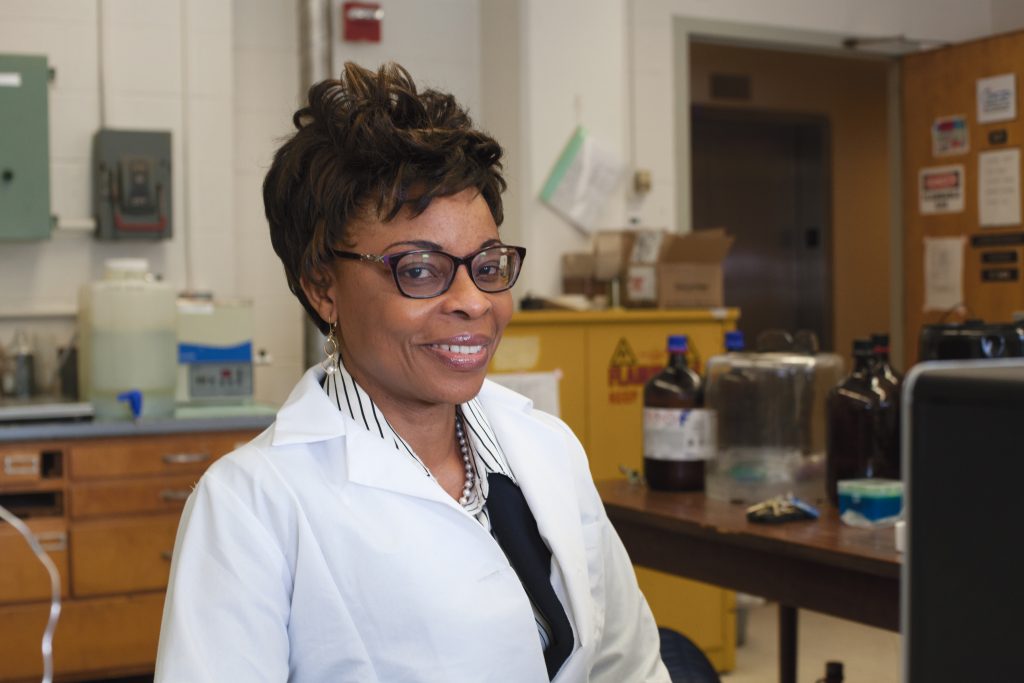
Binghamton University chemistry professor Omowunmi Sadik has received degrees on two continents and her research has been disseminated to numerous countries. Sadik’s far-reaching impact continued recently when she was recognized on the national level in both Nigeria and the United States.
In late November, Sadik was chosen as one of two recipients of the 2016 Nigerian National Order of Merit — Nigeria’s greatest honor for academic contributions made by its citizens — for her work in the field of surface chemistry, specifically biosensing technology. She is one of just four women, and the first female scientist, to be awarded this distinction. Previous honorees include recently deceased professor of Africana studies at BU, Isidore Okpewho.
After earning a bachelor’s degree in chemistry from the University of Lagos in Nigeria in 1985, Sadik received her Ph.D. in chemistry in 1994 from the University of Wollongong in Australia. She then worked at the U.S. Environmental Protection Agency before accepting a position at BU in 1996.
According to Wayne Jones, chairman and professor of the chemistry department, the implications of Sadik’s accomplishment are twofold.
“Accolades like this not only recognize the great work going on in Dr. Sadik’s lab, but they help to elevate the whole department,” he said. “Anytime Binghamton faculty get recognized, it helps the campus, it helps the community, it helps our students — it helps everyone.”
During a ceremony on Dec. 1 at the president’s official residence in the Nigerian capital city of Abuja, Sadik and fellow recipient Tanure Ojaide, a prolific poet, were thanked by President Muhammadu Buhari for their contributions to Nigerian scholarship. Sadik, who is currently on sabbatical, said that although her work has garnered numerous awards in the past, this particular honor stood out to her.
“It was a very special evening; I was very excited and thankful about it,” she said. “It’s very humbling as well to see that you’re one of those people whose work you have admired for so long.”
In her acceptance speech, Sadik emphasized the importance of research in addressing societal issues.
“Research, to me, is the highest form of intellectual pursuit,” she said. “It is there to answer societal problems. Research and innovation are critical to our continued development.”
Sadik’s current research focuses on the development of paper-based biosensors that can be used to detect pathogens present in agricultural crops. Her ultimate goal is to provide farmers with a low-cost technology that enables them to avoid planting in areas where these fungi, which can cut a crop’s yield by up to 70 percent, are likely to be found. She and her team have developed a prototype of this technology — a remotely operated sensing device called U-PAC (Ultra-Sensitive Portable Capillary Sensor). In order to fund this project, Sadik secured grants totaling $867,536 from the Bill and Melinda Gates Foundation and National Science Foundation last fall.
In mid-January, Sadik was chosen as one of 14 members of the 2017-18 Jefferson Science Fellowship program. The program is sponsored by the National Academies of Sciences, Engineering, and Medicine and selects tenured professors who have made significant contributions in their respective fields. As a fellow, Sadik will spend a year as a senior adviser to the U.S. secretary of state, providing up-to-date information on scientific advancements, which will then be used to make policy decisions.
Sadik has been a visiting faculty member at Harvard University, Cornell University and the U.S. Naval Research Laboratories, but said that BU differs from these institutions due to the frequent collaboration between students at different levels of academia.
“I see the connection here; undergraduates can interact with grad students and postdoctoral students,” she said. “Binghamton is a nurturing environment; it has a mix of teaching and research and scholarship.”


